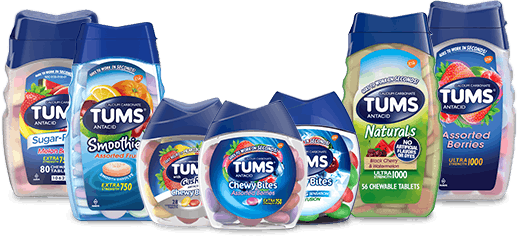How Late is Too Late to Eat?
When it comes to avoiding heartburn at night, knowing when to stop eating is key. Lying down too soon after a large meal is a surefire way to trigger heartburn.1 To lower your risk of occasional heartburn at bedtime, allow three to four hours between finishing a meal and going to sleep.1 This interval will give your stomach plenty of time to digest what you’ve eaten and lower the chance that you may experience heartburn during the night.1
What Causes Occasional Heartburn?
Heartburn is caused by acid reflux. It can be identified by a burning or painful feeling in your chest or sour taste in the back of your throat that can last anywhere from several minutes to several hours.1 When the lower esophageal sphincter (LES)—the valve that is located where the esophagus meets the stomach—isn’t working correctly and doesn’t fully close, it can permit stomach acid to travel backwards from the stomach into the esophagus. This backflow of stomach acid creates the burning sensation called heartburn.1,2 Experiencing heartburn may also include a burning feeling in the throat, an acidic taste in the back of your throat, or difficulty swallowing.1
There are several lifestyle choices and other factors that can increase your risk of occasional heartburn. Some people find that specific foods trigger heartburn.2 Being overweight or pregnant can also put pressure on the LES and put you at higher risk for experiencing heartburn.2
Why Does Eating Late at Night Cause Occasional Heartburn?
Since heartburn can be made worse by bending over or lying down, timing your meals right is essential.1,2 The process of digestion works more smoothly when it happens in an upright position.3 When you’re sitting or standing, the natural force of gravity helps move food down through the esophagus and into the stomach.3,4 When you lie down to go to sleep before your food has fully moved through the stomach, you heighten the risk of experiencing acid reflux and heartburn.3
What Foods Trigger Occasional Heartburn?
It’s important to make sure you’re not eating within three to four hours of going to sleep, but it’s also important to make sure you’re not eating trigger foods—especially late at night. Whether you’re having a late-night snack while gaming or enjoying a leisurely dinner that stretches into the wee hours, pay attention to what’s on your plate. The following foods are common trigger foods for acid reflux and heartburn. Reducing your intake, especially late at night, can lower you risk of experiencing heartburn:1,2
- Onions
- Tomatoes and tomato-based foods
- Spicy foods
- Citrus fruits
- Fried foods
- High-fat foods
- Chocolate
- Peppermint
- Alcohol
- Carbonated beverages
- Caffeinated beverages
Tips on Avoiding Occasional Heartburn at Night
Other than avoiding a meal within three to four hours of bedtime, there are other lifestyle choices you can take to help prevent occasional heartburn at night.
Eat smaller, lower-fat meals.
Try to keep meals under 500 calories and 20 grams of fat to optimize digestion.4
If you smoke, quit.
A scientific study has shown that quitting smoking can have a positive impact on occasional acid reflux.4
Eat slowly.
Eating too fast and filling your stomach too quickly can put undue pressure on the LES.5
Try sugar-free gum.
Chewing gum after you eat can increase salivation, which works to soothe the esophagus and neutralize stomach acid.5 Opting to chew a piece of gum instead of eating a late-night snack can be a smart alternative if you’re trying to avoid occasional heartburn triggered by late-night eating.5
Elevate your head.
Use a body pillow or sleep-positioning device to keep your head elevated while you sleep.4 Sleeping on your left side can also help lower the risk of occasional heartburn that may be experienced at nighttime.4
Lose weight if needed.
People that are overweight experience a higher risk of getting occasional heartburn.4,5 If you think losing weight might help curb your occasional heartburn, talk to a qualified healthcare provider like your doctor or a registered dietitian nutritionist about next steps.
When eating later is disrupting your sleep, taking a dietary supplement like TUMS+ Heartburn+ Sleep Support can help manage your occasional nighttime heartburn by neutralizing stomach acid while helping you get the rest you need.1 TUMS+ Heartburn+ Sleep Support is a dietary supplement with 5 mg of melatonin that relieves occasional heartburn and helps you fall asleep faster. ✝^*
✝Melatonin provides relief from occasional sleeplessness.
^Compared to those not taking melatonin.*
*These statements have not been evaluated by the Food and Drug Administration. This product is not intended to diagnose, treat, cure or prevent any disease.
Source Citations:
- Heartburn. Cleveland Clinic. https://my.clevelandclinic.org/health/diseases/9617-heartburn-overview. Accessed 12/14/2022.
- Heartburn: Symptoms & causes. Mayo Clinic. https://www.mayoclinic.org/diseases-conditions/heartburn/symptoms-causes/syc-20373223. Accessed 12/14/2022.
- Mayo Clinic Minute: Timing snacks to avoid heartburn. Mayo Clinic. https://newsnetwork.mayoclinic.org/discussion/mayo-clinic-minute-timing-snacks-to-avoid-heartburn/. Accessed 12/14/2022.
- Why Does Your Heartburn Always Seem Worse at Night? Cleveland Clinic. https://health.clevelandclinic.org/why-does-your-heartburn-always-seem-worse-at-night/. Accessed 12/14/2022.
- 11 stomach-soothing steps for heartburn. Harvard Health Publishing. https://www.health.harvard.edu/staying-healthy/11-stomach-soothing-steps-for-heartburn. Accessed 12/14/2022.


